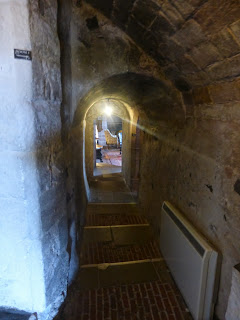I had always intended walking across the causeway to Holy Island so that I could visit Lindisfarne castle but as it was pouring down I decided to drive rather than walk the 3 miles across. You can only access the causeway at low tide which is about 6 -7 hours in every 24 so I was lucky as low tide was between 10am and 5pm.
 Whilst waiting for the tide to go out I stopped at an inlet and watched the curlews looking for food.
Whilst waiting for the tide to go out I stopped at an inlet and watched the curlews looking for food.
From the top of the castle you can see across to the Northumberland mainland and out over the North sea

Outside the castle, disused boats had been turned into sheds.
Close to the castle is a small garden protected from the harsh North easterly winds by a stone wall. The garden was designed by Gertrude Jekyll between 1906-1912.
Holy Island is regarded as the birthplace of Christianity in England. St Aidan founded a monastery here in the 7th cent with the priory built before the end of 634. The first monastery was destroyed by the Danes in the 9th cent but another was built again two hundred years later. Here are the ruins of the priory which look very impressive against the backdrop of the North sea.

In the 8th cent the famous illuminated manuscript known as the Lindisfarne Gospels was probably made here. It is the illustrated latin gospels of Matthew, Mark , Luke and John. In the 10th cent a monk named Aldred added an Old English translation of the latin text producing the earliest surviving English copy of the Gospels. The Lindisfarne Gospels are kept in the British Museum in London although many think they should be kept closer to where they originated.

There were a number of lobster pots that had been washed up on the shore.
 Whilst waiting for the tide to go out I stopped at an inlet and watched the curlews looking for food.
Whilst waiting for the tide to go out I stopped at an inlet and watched the curlews looking for food.
From the top of the castle you can see across to the Northumberland mainland and out over the North sea

Close to the castle is a small garden protected from the harsh North easterly winds by a stone wall. The garden was designed by Gertrude Jekyll between 1906-1912.
Holy Island is regarded as the birthplace of Christianity in England. St Aidan founded a monastery here in the 7th cent with the priory built before the end of 634. The first monastery was destroyed by the Danes in the 9th cent but another was built again two hundred years later. Here are the ruins of the priory which look very impressive against the backdrop of the North sea.

In the 8th cent the famous illuminated manuscript known as the Lindisfarne Gospels was probably made here. It is the illustrated latin gospels of Matthew, Mark , Luke and John. In the 10th cent a monk named Aldred added an Old English translation of the latin text producing the earliest surviving English copy of the Gospels. The Lindisfarne Gospels are kept in the British Museum in London although many think they should be kept closer to where they originated.
Before leaving the Island I took one last walk along the pebbled beach by the small harbour.

There were a number of lobster pots that had been washed up on the shore.


















What a beautiful but rugged place. I bet it an get cold and windy there. The photo of the monastery ruins and flowers in front is a super shot as too the pebbles on the beach. Interesting history too. The upturned boat for a shed is a neat idea.
ReplyDeleteWhat a cool place! Thanks for sharing your photos and history. I especially like the shed made from a boat. We just don't have these amazing old castles and buildings here in the US.
ReplyDeleteOh I loved this tour...a place I knew absolutely nothing about...and now would love to go there. So you have to be sure and leave before the tide comes in huh? The castle does look cozy, for a castle.
ReplyDeleteLindisfarne is an interesting island. People in cars are often washed off the causeway through sheer stupidity.
ReplyDeleteI also knew nothing about this island before this post. Or its history in Christianity, either. Thanks for the lesson, and the great pictures. I felt as if I were there with you1 :-)
ReplyDeleteI always remember listening to Lindisfarne "Fog on the Tyne" and it is one p[lace on my todo list that I want to visit, again you have me envious
ReplyDeleteWhat a nice post with great photos. I like those interesting stories about history.
ReplyDeleteWonderful ruins and I love the shed made from part of a boat's hull. Very cool!
ReplyDeleteI have read about Lindisfarne and your photos make it even more interesting. It's a place I would love to see - but am unlikely to ever do so!
ReplyDeleteWhat a beautiful wild place. I love the boat hull shed.
ReplyDeleteThat whole stretch of coastline is great - and I dont think it gets the amount of publicity it should - which was great when I lived in Newcastle because the place was never crowded!
ReplyDeleteCheers - Stewart M - Melbourne
PS: sorry for slow reply - I have been out of phone / internet range for most of the week - rather nice if the truth be told!